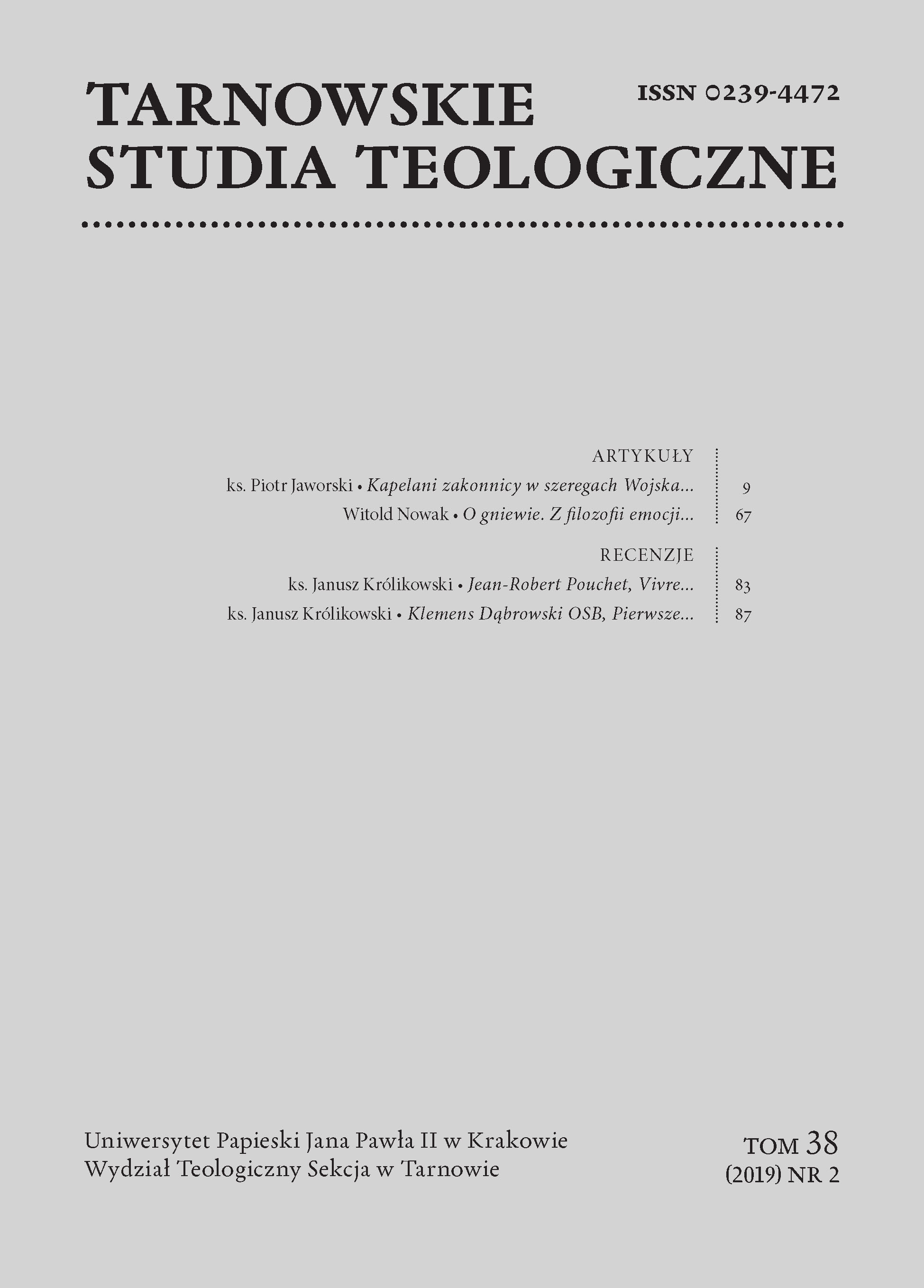O gniewie. Z filozofii emocji
DOI:
https://doi.org/10.15633/tst.38202Słowa kluczowe:
gniew, łagodność, wybaczanieAbstrakt
Gniew jest jedną z najsilniejszych emocji negatywnych i od starożytności uznawany był za jedną spośród głównych ludzkich wad. Temat gniewu jest wszechobecny w kulturze i manifestuje się na różne sposoby — gniew ma różne oblicza. Pozostaje jednak zawsze związany z problemem natury ludzkiej. Główna część artykułu jest poświęcona prezentacji — opisowi i analizie — filozoficznego podejścia do gniewu. W kulturze Zachodu dwa główne poglądy na gniew zostały sformułowane przez Arystotelesa i stoików. Najbardziej jednoznaczną dezaprobatę gniewu przedstawił Seneka. W O gniewie i O łagodności uznał on gniew za przynoszący wstyd brak opanowania i pomieszanie wewnętrzne. Ważnym, lecz trudnym do opisania rodzajem gniewu jest resentyment. Ostatecznie artykuł wskazuje na cnotę łagodności jako mogącą nas uchronić przed niebezpieczeństwami spowodowanymi błędem nierozumnego gniewu.
Bibliografia
Arystoteles, Etyka nikomachejska, przełożyła, opracowała i wstępem poprzedziła D. Gromska, Warszawa 1956.
Arystoteles, Retoryka, w: Arystoteles, Retoryka — Poetyka, przełożył, wstępem i komentarzem opatrzył H. Podbielski, Warszawa 1988, s. 3–296.
Bommarito N., Virtuous and Vicious Anger, „Journal of Ethics and Social Philosophy” 11 (2017) nr 3, s. 1–28.
Castiglione B., Książka o dworzaninie, przekład, wstęp i opracowanie A. Borowski, Kraków 2018.
Conquest R., Wielki terror, przeł. W. Jeżewski, Warszawa 1997.
Elias N., O procesie cywilizacji. Analizy socjo- i psychogenetyczne, przeł. T. Zabłudowski i K. Markiewicz, Warszawa 2011.
Freud Z., Aktualne uwagi o wojnie i śmierci, w: Z. Freud, Pisma społeczne, przeł. A. Ochocki, M. Poręba, R. Reszke, Warszawa 1998, s. 29–78.
Kant I., Metafizyczne podstawy nauki o cnocie, przekład i wstęp W. Galewicz, Kęty 2005.
Klibansky R., Panofsky E., Saxl F., Saturn i melancholia. Studia z historii, filozofii, przyrody, medycyny, religii i sztuki, przeł. A. Kryczyńska, Kraków 2009.
Korwin-Łopuszański J., Gniew i strach w „Etyce” Arystotelesa, „Roczniki Filozoficzne” 39 (1981) z. 2, s. 49–73.
Krajewski M., Incydentologia, Warszawa 2017.
Kultura afektu — afekty w kulturze. Humanistyka po zwrocie afektywnym, red. R. Nycz, A. Dauksza, A. Łebkowska, Warszawa 2015.
Markowski M. P., Wojny nowoczesnych plemion. Spór o rzeczywistość w epoce populizmu, Kraków 2019.
Montaigne M. de, O gniewie, w: M. de Montaigne, Próby, przełożył i wstępem opatrzył T. Żeleński (Boy), t. 2, Warszawa 1957, s. 494–503.
Nussbaum M., Gniew i wybaczanie. Uraza, wielkoduszność, sprawiedliwość, przeł. J. Kolczyńska, Warszawa 2016.
On Anger, eds. A. Callard, D. Chasman, J. Cohen, Cambridge (Massachusetts) 2020.
Piekarz D., (Nie) święty gniew. Co Biblia mówi o złości?, Kraków 2019.
Piłat R., Krzywda i zadośćuczynienie, Warszawa 2003.
Platt K. M. F., Terror i wielkość. Iwan i Piotr jako rosyjskie mity, przeł. K. Sosnowska, Warszawa 2013.
Reale R., Historia filozofii starożytnej, t. 4: Szkoły epoki cesarstwa, przeł. E. I. Zieliński, Lublin 2012.
Ripa C., Ikonologia, przeł. I. Kania, Kraków 1998.
Scheler M., Resentyment a moralność, przeł. J. Garewicz, Warszawa 2008.
Seneka L. A., O gniewie, w: L. A. Seneka, Myśli, wybrał, opracował i przełożył S. Stabryła, Kraków 1987, s. 69–128.
Seneka L. A., O łagodności, w: L. A. Seneka, Myśli, wybrał, opracował i przełożył S. Stabryła, Kraków 1987, s. 337–365.
Sloterdijk P., Gniew i czas. Esej polityczno-psychologiczny, Warszawa 2011.
Sofsky W., Traktat o przemocy, przeł. M. Adamski, Wrocław 1999.
Sun Zi, Sztuka wojenna, przeł. M. Wiśniewska-Wyrwas, Ożarów Mazowiecki 2017.
Szyndler B., Pojedynki, Warszawa 1987.
The Oxford Handbook of Philosophy of Emotion, ed. P. Goldie, Oxford 2009.
Tradycja kartezjańska po zwrocie afektywnym. Mieke Bal: „Reasonable Doubt”, red. M. Gomulska, W. Kozioł, G. Sułkowska Kraków 2019.
Wigura K., Wynalazek nowoczesnego serca. Filozoficzne źródła współczesnego myślenia o emocjach, Warszawa 2019.
Pobrania
Opublikowane
Numer
Dział
Licencja

Utwór dostępny jest na licencji Creative Commons Uznanie autorstwa 4.0 Międzynarodowe.
Autorzy publikujący w czasopiśmie udzielają jego wydawcy zgody o następującej treści:
- Autor zachowuje autorskie prawa majątkowe do utworu, a jednocześnie udziela wydawcy czasopisma zgody na jego pierwszą publikację w wersji drukowanej i wersji online na licencji Creative Commons Uznanie autorstwa 4.0 Międzynarodowe oraz zgody na wykonywanie opracowań, w tym przekładów.
- Autor ma możliwość udzielania zgody niewyłącznej na opublikowanie utworu w wersji, która ukazała się w czasopiśmie (np. zamieszczenia go w repozytorium instytucjonalnym lub opublikowania w książce), wraz z informacją o jego pierwszej publikacji w czasopiśmie.
- Autor może umieścić swój utwór online (np. w repozytorium instytucjonalnym lub na swojej stronie internetowej) jeszcze przed zgłoszeniem utworu do czasopisma.

